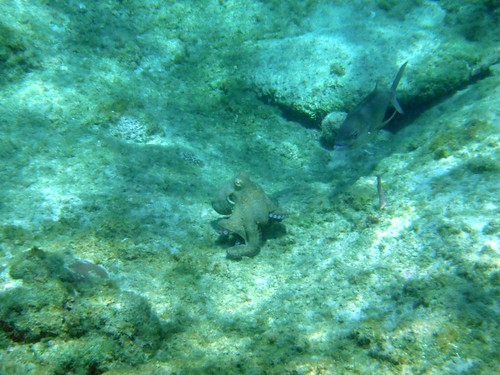
ObCephalopod: Cayman Islands reef octopus faces down boring vertebrate (Creative Commons photo by Pete)
The International Union for the Conservation of Nature’s World Conservation Congress is taking place right now in South Korea, and a report from Friday’s session is trickling through various social media, including The New York Times’ Green blog: Caribbean coral reefs are in trouble.
From the WCC’s coral reef workshop’s Executive Summary (PDF):
Some Caribbean reef ecosystems are relatively intact compared to average conditions in the region. For example, many reefs in the Netherlands Antilles and Cayman Islands have 30% or more live coral cover, little macroalgae, and a moderate (albeit strongly depleted) abundance of fish. In contrast, reefs in Jamaica and the US Virgin Islands have well below 10% live coral cover, abundant macroalgae, and virtually no fish larger than a few cm.
When local reefs that are 70% dead qualifies as “relatively intact compared to average conditions in the region,” headlines like NatGeo’s “Caribbean Coral Reefs Mostly Dead, IUCN Says” stop seeming quite so alarmist.
The issue with macroalgae is that they encroach on coral reefs and compete with the coral organisms. They’re often present in healthy reefs, kept in control by algae-eating animals. When those fish aren’t there for one reason or another, or when a reef gets a big shot of extra nutrients from on-shore fertilizers or eroded soil, the algae can get out of hand.
The Smithsonian Tropical Research Institute assembled 36 scientists in Panama to assess the region’s coral reefs, and the results of that work are what were presented at the WCC Friday. Researchers are pinning the damage on human interference. The precise mechanism by which we’re killing the reefs is open to question, but they have some prime suspects:
Caribbean reefs with the highest surviving coral cover and least macroalgae tend to be characterized by little land-based pollution, some degree of fisheries regulations and enforcement, moderate economic prosperity, and lower frequency of hurricanes, coral bleaching, and disease.
The team will have a more complete analysis of their data by mid-2013, and plan to expand their survey to other oceans’ reefs by 2016.
This isn’t a surprise: the degradation of Caribbean reefs has been talked for decades. Coral reefs serve as nurseries for commercially important fish species, they absorb wave energy and thus shelter coastlines from storm damage, and they’re just full of fascinating critters. Reefs can recover from our damage if we start to protect them: parts of Australia’s Great Barrier Reef recently recovered from bleaching events a lot more quickly than scientists had hoped.
But it’s still awful news.


